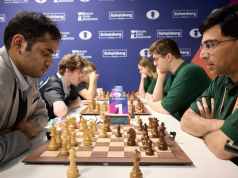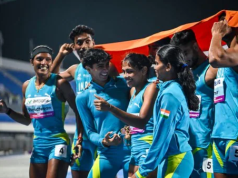The 5th edition of the World Nomad Games took place at Astana City in Kazakhstan from 8th to 13th September 2024.
The Nomads of Central Asia
The endless grasslands of Central Asia-the Steppes as we call them. Centuries ago, these grasslands were unsuitable for intensive farming and a dense population, thus, giving rise to a scattered nomadic population herding cattle and sheep.
The harsh climatic conditions of the Steppes bred tough people and skilled warriors and from this single region emerged strong nomadic tribes – the Huns, the Mongols, the Magyars, the Turks, the Xiongnu, the Scythians, the Goths – all of whom went on to contribute to shaping the modern world history.
Though these nomadic tribes lived among raids, invasions, conquests and chaos, they took pride in coming together and participating in competitive sports. Their games, rooted in physical strength and preparation for combat, revolved around three primary sports-horse racing, wrestling and archery.
History of World Nomad Games
Across decades, the unique cultural tradition and historical narratives of the ‘Nomads of Central Asia’ have attracted travellers, tourists, exursionists, backpackers and others. The World Nomad Games was conceptualised to provide an essential platform to celebrate and maintain the distinctive Nomadic customs of the region under increasing threat from globalisation and modernisation.
A part of the UNESCO World Heritage List, the World Nomad Games was first organised in 2014 on the shores of Lake Issyk Kul in Cholpon Ata under the leadership of the President of the Kyrgyz Republic, Almazbek Atambaev.
September was chosen as the preferred month for celebration as, historically, the nomadic people completed their migration from summer to winter camping during this time of the year. The path of the caravan of people and animals with yurts and possessions traditionally ended at the new camping area with rituals, games and competitions.
While planning for the first edition of the Games, the Kyrgyz government encountered financial challenges and criticisms about whether traditional games would attract athletes and spectators. But proving critics wrong, the first edition had 583 athletes from 19 countries who participated in 10 different ethno-sports.
Since then, the World Nomad Games have taken place every two years and have developed into a major global gathering that highlights the old-fashioned tradition of the nomads. They also foster a sense of unity among Central Asian nations, each of which shares a common nomadic heritage.
Cholpon Ata remained the home to the 2016 and 2018 editions wherein, 1200 athletes from 62 countries and 2000 athletes from 82 countries participated in the respective tournaments. However, in 2022, the 4th edition was shifted to Iznik in Turkey with 3000 athletes from 82 countries participating in 13 sports.
5th World Nomad Games
The choice of Astana to host the 5th edition of the Games was made consciously as this Kazakh city perfectly aligns with the theme of cultural heritage and modern progress. The World Nomad Games was brought to Kazakhstan to exemplify this fusion of tradition and modernity with the motto “The Gathering of the Great Steppe”.
Despite Kazakhstan being hit by severe floods, the country successfully organized this grand event, bringing people of different nations together and progressing strategically through bilateral discussions and dialogues while enhancing cultural exchange from a broader perspective.
Some of Central Asia’s Wildest Sports
Kok Buru, one of the most famous disciplines of the World Nomad Games, is best described in English as rugby on horseback with a dead goat as a ball.
It is a martial equestrian art of the nomadic people where strong and brave men on horseback grab hold of a headless carcass (made of rubber for these games), hoist it under their leg, sprint for the opposition’s line and then dump it in a ring of rope or a large plastic doughnut.
Archery- both traditional and on horseback- evocates the feeling of Central Asia’s warrior past. There is a high probability that some of the archers competing at the Games turn out to be the descendants of Genghis Khan or Tamerlane. They are there representing the Steppe people’s unrivalled mastery of iron stirrups and composite bows.
Kusbegilik is another highly unusual sport that is featured at the Nomad Games. The event has three categories at the competition- hunting with eagles (Burkit), hawks (Karshyga) or falcons (Itelgi). It takes many years for an experienced hunter (Berkutchi) to tame and train a hunting bird.
There are various martial art forms like Kurash, Koresh, Alysh, and Qazaq Kureshi. But Audaryspak (Horseback Wrestling) is quite wild and vicious. The bouts take place in a 15m-diameter sandy arena where each participant aims to pull his opponent onto the ground. The wrestler also gets points for lifting his opponent from the saddle or pushing them out of the circle.
Indian Participation at the Games
It is an unknown fact that Indian athletes too performed at the World Nomad Games 2024. This year around 45 participants were competing in Sadaq atu (Traditional Archery), Kurash & Alysh (Belt Wrestling), and Qazaq Kureshi (Traditional Kazakh Wrestling).
India returned with 1 gold medal and 5 bronze medals. Pincky Balhara, 2018 Asian Games silver medallist, won gold in Women’s -57kg category in Kurash. Balhara is also a bronze medallist in the Asian Beach Games in 2016.
Om Rattan and Veerdavinder Walia won bronze in Men’s -60kg Kurash and +100kg Kurash respectively.
In Women’s Qazaq Kureshi, India’s Vaishali won bronze in the Seniors 48kg category. The fifth bronze was won by Annu in Seniors 65kg Qazaq Kureshi.
A Celebration of Ethnic Culture
With games and sports, tunes and flutes, cuisines and attires and even the art of epic storytelling- the World Nomad Games showcase the rich heritage of Central Asia. The Games also attract a significant portion of world tourists who experience people-to-people contact and cultural connect leading to the celebration of nomadic culture and ethnic lifestyle.



